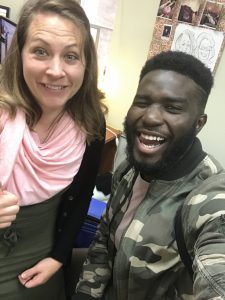 If I told you that I didn’t enjoy my time at my internship, I would be lying. My time working for the University Marketing and Communication here at Michigan Tech has been one that I could never have imagined. The skills and experiences I learned are so important in helping me be a better professional in my field.
If I told you that I didn’t enjoy my time at my internship, I would be lying. My time working for the University Marketing and Communication here at Michigan Tech has been one that I could never have imagined. The skills and experiences I learned are so important in helping me be a better professional in my field.
Working with a supervisor that always pushes me to be better and also allows me to express myself is something I never thought I would get out of a job. Also, working with a team that I can always learn from is great because I gain so much knowledge from different people in so many different areas.
My favorite moments in my internship were the times a client was thoroughly impressed with the end result of a project. This made me feel like I was really giving my all and it was being recognized, and I’m sure it made my supervisor proud, too. It meant that all I was learning was being applied to my work.
I could talk about all that I did and how I did it but what I’d rather say is that the experience is something that I’ll cherish. I think that as a student being able go out into the word and work really allows you to learn so many things that you might learn in the classroom, but it lets you apply what you’ve learned in the classroom to whatever job you are doing. The classes we take do a great job of preparing us for a lot of what’s going to come.
In summary, this is a great opportunity. Give your absolute best and try to learn as much as you can.
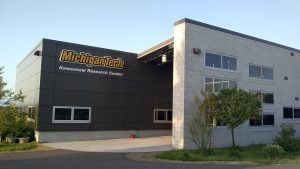
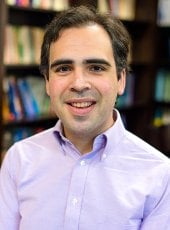 The Department of Humanities congratulates
The Department of Humanities congratulates 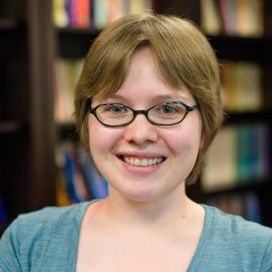 Anna K. Swartz, a graduate of Rhetoric, Theory & Culture, participated as an invited panelist at the 2018 Saks Institute for Mental Health Law, Policy and Ethics Spring Symposium: “Held Against My Will: Conversations About Involuntary Commitment and Forced Treatment” at the University of Southern California Gould School of Law in Los Angeles, California on April 16.
Anna K. Swartz, a graduate of Rhetoric, Theory & Culture, participated as an invited panelist at the 2018 Saks Institute for Mental Health Law, Policy and Ethics Spring Symposium: “Held Against My Will: Conversations About Involuntary Commitment and Forced Treatment” at the University of Southern California Gould School of Law in Los Angeles, California on April 16. Nancy Henaku, a fourth-year Ph.D. student in the RTC program, has received one of three inaugural Feminist Research Grants awarded by the Coalition of Feminist Scholars in the History of Rhetoric and Composition. This will support her travel to archives for her dissertation research on the rhetoric of Nana Konadu Agyeman-Rawlings, the first female candidate for president of Ghana. The review committee “expressed great enthusiasm for [her] dissertation project, which is poised to bring important perspective from the global South and specifically from Ghana to ongoing research in transnational feminist rhetoric.”
Nancy Henaku, a fourth-year Ph.D. student in the RTC program, has received one of three inaugural Feminist Research Grants awarded by the Coalition of Feminist Scholars in the History of Rhetoric and Composition. This will support her travel to archives for her dissertation research on the rhetoric of Nana Konadu Agyeman-Rawlings, the first female candidate for president of Ghana. The review committee “expressed great enthusiasm for [her] dissertation project, which is poised to bring important perspective from the global South and specifically from Ghana to ongoing research in transnational feminist rhetoric.”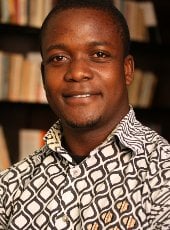 Brilliant Books in Traverse City, recently interviewed Rhetoric, Theory and Culture PhD student, writer and poet Edzordzi Agbozo about his writing. Two of Agbozo’s poems appear in the spring 2018 issue of Northern Michigan’s premier literary journal, Dunes Review. See the full interview
Brilliant Books in Traverse City, recently interviewed Rhetoric, Theory and Culture PhD student, writer and poet Edzordzi Agbozo about his writing. Two of Agbozo’s poems appear in the spring 2018 issue of Northern Michigan’s premier literary journal, Dunes Review. See the full interview 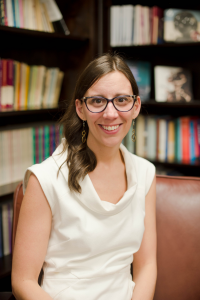 RTC PhD student Sarah Potter received a top paper award and presented the paper on the panel, Top Papers in the Communication Ethics, Activism, and Social Justice Interest Group at the Central States Communication Association Conference. The paper title is “Different Rights (in)Different Times: Rendering the Invisible Visible in a Comparative Iconographic Analysis of the Women’s Suffrage Parade of 1913 and the 2017 Women’s March on Washington.” She was also a panel member for the graduate student discussion session, “When the Experts Don’t Agree: Navigating Differences in Faculty Advice.” The conference was held April 5-8, 2018 in Milwaukee, Wisconsin.
RTC PhD student Sarah Potter received a top paper award and presented the paper on the panel, Top Papers in the Communication Ethics, Activism, and Social Justice Interest Group at the Central States Communication Association Conference. The paper title is “Different Rights (in)Different Times: Rendering the Invisible Visible in a Comparative Iconographic Analysis of the Women’s Suffrage Parade of 1913 and the 2017 Women’s March on Washington.” She was also a panel member for the graduate student discussion session, “When the Experts Don’t Agree: Navigating Differences in Faculty Advice.” The conference was held April 5-8, 2018 in Milwaukee, Wisconsin.